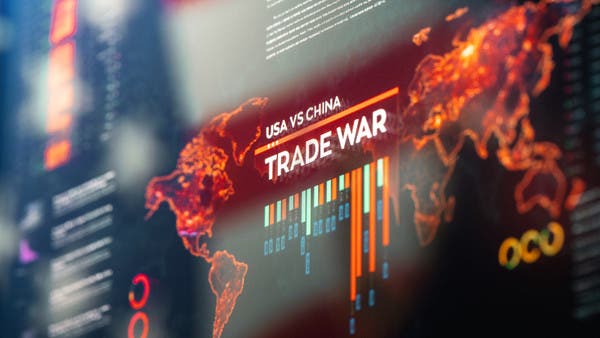Escalating trade tensions between the United States and China are no longer confined to economic disputes but reflect broader geopolitical competition, according to Abd El-Hamid Mamdouh, former official at the World Trade Organization. In an interview with “Al Arabiya Business,” he explained that Beijing aims to assert itself as a global power on par with Washington across multiple domains.
Mamdouh highlighted that China’s recent decision to relinquish preferential treatment for developing nations at the WTO during the UN General Assembly signaled its positioning as an advanced economy equal to Western counterparts.
He pointed to China’s latest move restricting exports of rare earth minerals as a strategic lever with significant impact on the US, given these materials are essential in high-tech industries such as smartphones, electric vehicles, semiconductors, and even certain defense applications.
According to Mamdouh, China’s leverage in trade disputes surpasses that of the US. While American markets heavily depend on Chinese rare earth supplies—with limited alternative sources—China maintains diversified export destinations, giving it greater resilience and negotiating power.
On the topic of the People’s Bank of China expanding its gold reserves, Mamdouh noted this reflects efforts to strengthen the yuan’s monetary base and enhance its international standing. However, he dismissed the likelihood of the yuan or any other currency replacing the US dollar as the dominant global reserve currency in the near future. Approximately 70% of international trade still occurs in dollars, and no realistic alternative—be it the yuan, euro, or others—has emerged to challenge this dominance.
He also observed growing sympathy among major trading partners like the European Union, the UK, and Canada toward China’s stance against US policies. Despite their close security and military ties with Washington, these nations appear increasingly inclined to support reforms in the global trading system.
This alignment, Mamdouh clarified, does not imply a formal alliance but indicates a shared interest in restoring the multilateral, rules-based trade framework overseen by the WTO, which has been undermined by unilateral actions in recent years.
— news from العربية
— News Original —
التوترات التجارية بين أميركا والصين تتجاوز البعد الاقتصادي إلى استعراض القوة
الرئيسية n nأسواق n nقصص اقتصادية n nالحرب التجارية n nقال المدير السابق في منظمة التجارة العالمية، عبد الحميد ممدوح، إن التوتر التجاري المتصاعد بين الولايات المتحدة والصين يتجاوز البعد الاقتصادي، مشيراً إلى أن بكين تسعى لتأكيد موقعها كقوة موازية لأميركا على مختلف الصعدة. n nوأوضح في مقابلة مع “العربية Business” أن الصين أعلنت على هامش اجتماعات الجمعية العامة للأمم المتحدة تنازلها عن المعاملة التفضيلية الممنوحة للدول النامية في منظمة التجارة العالمية، لتشير إلى أنها على قدم المساواة مع الدول الاقتصادية المتقدمة. n nأضاف أن الخطوة الصينية الأخيرة بفرض قيود على تصدير المعادن النادرة تمثل ورقة ضغط مؤلمة على الولايات المتحدة، نظراً لأن هذه المعادن تدخل في صناعات التكنولوجيا المتقدمة مثل الهواتف المحمولة والسيارات الكهربائية وأشباه الموصلات، وحتى في بعض الصناعات الدفاعية. n nأكد أن أوراق الضغط الصينية أقوى وأكثر تأثيراً من نظيرتها الأميركية، لأن الصين لديها أسواق بديلة متعددة لتصدير منتجاتها، بينما الولايات المتحدة لا تمتلك مصادر متعددة لتأمين احتياجاتها من المعادن النادرة. n nوفيما يتعلق بتوسع بنك الشعب الصيني في شراء الذهب، قال ممدوح إن هذا التوجه يهدف إلى تعزيز القاعدة النقدية الصينية ودعم مكانة اليوان، لكنه استبعد إمكانية إحلال اليوان أو أي عملة أخرى محل الدولار الأميركي في المدى المنظور، مشيراً إلى أن نحو 70% من التجارة الدولية ما زالت بالدولار الأميركي، ولم يظهر بعد أي بديل واقعي يمكن أن يحل مكانه، سواء كان اليوان أو اليورو أو غيرها. n nوأشار إلى تعاطف متزايد من قِبل شركاء تجاريين رئيسيين مع الموقف الصيني في مواجهة واشنطن، مثل الاتحاد الأوروبي والمملكة المتحدة وكندا، رغم ارتباط هذه الدول بالولايات المتحدة بعلاقات أمنية وعسكرية تجعلها في موقف خضوع لأميركا. n nوأوضح أن هذا التعاطف لا يعني بالضرورة تحالفاً رسمياً، لكنه يعكس رغبة مشتركة في إصلاح النظام التجاري الدولي وإعادته إلى الإطار القانوني متعدد الأطراف الذي تمثله منظمة التجارة العالمية.
